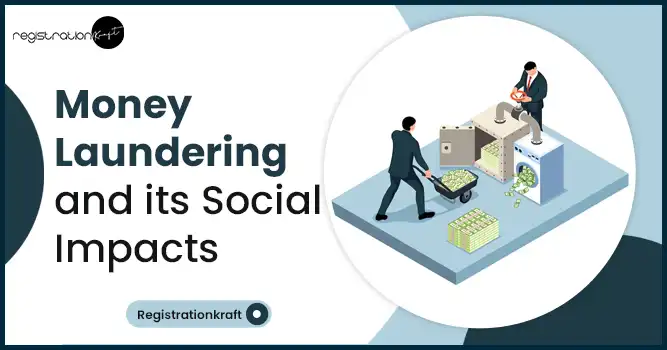Money Laundering and its Social Impacts

Criminals take ‘dirty money’ and effectively ‘clean’ it to make it seem like they have legitimately earned the money. This process is known as Money Laundering.
When the criminals make money, they need to disguise how and why the money came into their hands. Money laundering enables them to do this by making it seem like the money they have acquired is from a legal source.
In this article, we will discuss the impact of money laundering on society.
Overview of Money Laundering
Money laundering is a process through which the ‘black money’ obtained from illegal activities such as drug trafficking, human trafficking, organized crime, corruption and tax evasion gets converted into ‘white money’. Money laundering is a worldwide challenge, and is considered a serious financial crime.
Due to money laundering, the drug traffickers, smugglers, and other criminals get to expand their operations. In extreme cases, money laundering can even lead to a complete takeover of a legitimate government. Ultimately, the society has to pay the cost through an erosion of trust in the financial system’s integrity.
What are the Social Impacts of Money Laundering?
The economy of a country obviously faces some dramatic repercussions when it comes to the laundering of money. But the society also suffers greatly due to the money laundering activities’ repercussions.
Many criminals or launderers get to expand their operations due to the issue of money laundering. This leads to increased frequency in crimes. Let’s discuss the social impacts of money laundering in detail:
Socio-cultural Disintegration
Socio-cultural disintegration refers to a phenomenon wherein low-employment rates, an absence of government’s attention, economy’s unwarranted subsiding, and cultural animosity altogether create strain on the population. As a result, many people turn to illegitimate means to alleviate. Organized crime plays on this to recruit labor and exploit hardship which brings about an obvious social impact as the strain leads to creation of an illegal labor force.
Inequality and Social Turmoil
Financial crimes have been associated with income disparities and social unrest. Countries with high levels of corruption have an increased inequality, according to the landmark study titled ‘Does Corruption Affect Income Inequality and Poverty?‘ by the International Monetary Fund (IMF). Due to the covid-19 pandemic, this dangerous cycle has been expedited since millions of people have been pushed into extreme poverty. If the concentration of wealth and power are in the hands of a few, this can result in increased social tensions which can lead to protests and even violent conflicts.
Inequality can lead to the creation of barriers to economic growth and development since the resources are not distributed equitably, and the poor cannot access opportunities. As a result of this, the cycle of poverty is perpetuated and social mobility is undermined.
Human Trafficking
Criminals are involved in human trafficking at an alarming rate, as they consider it a profitable venture. This has a major social impact, mainly on the trafficking victims. These victims are taken away from comfort, and sold off in the illegal trade market. Many victims are provided goods by the offenders, which are then used for the purpose of blackmailing.
The most likely source of human trafficking is an organized crime as the proceeds generated from this are extensive, and almost all of the proceeds need to be laundered into a legitimate financial system before it can be used in the future. Due to this, the offenders are provided with the resources to continue trafficking goods and services (in this case, the human beings are the commodity). Due to human trafficking, the victims are uprooted and separated from their families and communities.
Dissolution of Public Trust in Financial System
The impact of money laundering on victims goes beyond their economic consequences. One significant impact is that money laundering leads to an erosion of public trust in financial institutions.
The legitimacy of financial systems, governments and other institutions is undermined due to the illegal activities which are a part of money laundering. This lack of trust can result in political instability. People who have lost faith in the financial system become more susceptible to extremist and populist movements, which can cause political polarization and social unrest. The root causes of money laundering must be addressed on priority to restore the faith of the public in the financial institutions.
Corruption
Corruption due to money laundering is a systemic issue since throughout the money laundering process, the first step which is called ‘placement’ (which indicates the placing of laundered money into the legal source), is the most vulnerable stage when it comes to the identification. Therefore, due to third party failures, instances occur where the system is corrupted. For example, accountants or lawyers might purposely fail their due diligence obligations.
The government’s diminishing legitimacy is the social impact, especially if they are knowingly involved in corruption. They’re supposed to uphold the intrinsic values of the society and not the other way round. In addition to this, it also has social implications on the market since large countries can process transactions in higher quantities which allow for more frequent exploitation of loopholes that are harmful to consumers, entities and the market. Hence, the link between organized crime, politics and society is strengthened due to corruption. As a result, the very point of democracy gets compromised.
Unlawful Drug Dealing
The selling of drugs is deemed as a profitable business, and has a huge impact on the society since it leads to an increased use of drugs. According to the Economic Times, global drug trafficking is estimated to be worth $650 billion dollars. The unlawful drug trade interferes with almost all levels of human security pertaining to health, and social and economic well-being. The black money generated through unlawful drug trade has to be made ‘clean’. Thus, the drug traders have to practice money laundering.
In order to prevent illegal trading of drugs in India, the Narcotic Drugs and Psychotropic Substances Act was enacted in 1985. This act prohibits an individual from producing, manufacturing, cultivating, possessing, selling, buying, transporting, storing and/or consuming any narcotic drug or psychotropic substance. However, there are still many people who go against the law and get away with it.
What are the Different Methods of Money Laundering?
Criminals make all the efforts to make their dirty money look clean. There are many methods of money laundering such as:
Smurfs
The term ‘Smurf’ is used to describe a money launderer who wants to avoid the examination of the government. In order to do this, they use placement, layering and integration steps to conceal the money. Large amounts of money are deposited in different bank accounts using smaller transactions.
If the financial institutions are suspicious of an individual or company’s money, they should report the same to the financial regulators and authorities. Since the money is deposited in smaller amounts, money launderers are able to make the deposited money look legitimately sourced.
Mules
Mules refers to the individuals who are hired by the money launders to assist them in their laundering activities. Just like drug mules, money mules may be recruited unknowingly. The only difference is that instead of smuggling drugs, they carry money.
Generally, the individuals who are hired are approached by money launderers and normally have no idea about the money laundering scheme. They may be promised an attractive-package job, and feel tempted to take it. Criminals usually target individuals having no criminal record or those who are financially weak. A mule is responsible for opening bank accounts and depositing money into them. Thereafter, the money launderers begin making wire transfers and use currency exchanges to move the money around the financial system to make it look legitimate, and avoid any further detection.
Shells
Shell corporations or shells are companies which do not have any business activity, employees or assets. Many shells are genuine and legitimate businesses that are used for raising funds for the operation of a startup company or to manage a merger or acquisition. However, many shell companies are created by scamsters who want to conceal their illegal activities or avoid payment of taxes.
Many fraudsters open shell companies in jurisdictions where their anonymity is guaranteed, as the same allows them to make deposits and transfer money in several accounts. Shells allow individuals to avoid reporting their income and paying taxes to the tax authorities.
Other Methods
It is clear that money launderers try to hide their money through deposits and shell companies. However, they also use other methods to do launder money such as:
- Counterfeiting
- Carefully and secretly investing in and selling real estate assets
- Gambling
- Making an investment in mobile commodities like gemstones and gold that can be easily moved to other jurisdictions
How can Digital Money Laundering be Detected?
Financial regulators have policies regarding anti-money laundering in place. Banks and NBFCs are required to comply with the rules and regulations mentioned in the policies, in order to ensure a safe system where criminal activities are spotted and reported to the relevant authorities in a timely manner.
For example, if a bank notices a large sum of money being deposited in a bank account, or finds any suspicious activity that takes place within an individual or company’s bank account, the matter must be reported to the relevant authorities. However, some laws are seemingly slower to catch up on digital crimes. Nonetheless, the financial institutions, their employees, and others can take some steps for detecting digital laundering of money, including:
- Collecting information related to possible and known networks of mules
- Monitoring transactions which are of high-volume and seemingly suspicious
- Ensuring that the KYC protocols for the clients/customers are adhered to regularly
- Verifying the money deposited, as well as the sources and beneficiaries.
- Implementing strict identification procedures online before allowing certain transactions to take place.
Some nations have gone even further by prohibiting certain practices, such as the use of digital currencies or cryptocurrencies. In 2014, the Financial System Supervision Authority, of the Latin American Country Bolivia, passed a resolution to prohibit the use of Bitcoin and other crypto currencies due to the lack of consumer protection and the potential for money laundering activities. However, with time, changes are being made to increase the transparency level of cryptocurrencies.
Must Read: What Statutory Compliances are Required for Payroll in India?
Prevention of Money Laundering Act, 2002
The Act of Parliament, Prevention of Money Laundering Act, 2002 was enacted by the NDA government to prevent the unlawful practice of money laundering and provide for confiscation of assets derived from such a practice. The act came into force with effect from 1st July, 2005.
While it is obvious from the Act’s name the purpose it serves, it would be better to take a look at its objectives to fully understand its relevance.
- To prevent money laundering and control it
- To confiscate or take into custody any property which has most likely been gained from or has been involved in money laundering cases.
- To punish the money launderers for their offenses
- To make it necessary for financial institutions like banks, NBFCs and intermediaries to store records or documents pertaining to financial transactions.
- To appoint the adjudicating authority and appellate tribunal to take charge of matters pertaining to money laundering.
- To manage any other matters concerned with money laundering.
Conclusion
The act of hiding money has been a continued practice for many centuries, and it is the nature of money launderers to attempt to remain undetected by changing their approaches and keeping one step ahead of law enforcement as the governmental organizations work together to come up with new ways to detect them.
Money laundering is a serious financial crime. It leads to inequality in society. It makes the rich richer, and causes an imbalance amongst the public. Legitimizing the money made through illegal activities such as drug trafficking, terrorism funding, human trafficking, etc., has a serious social and economic cost on the society. Hence, the central and state governments along with international organizations must take all the measures to combat money laundering. If you liked this blog post, do check out the rest of our blog posts!
Categories: Finance
Tags:




